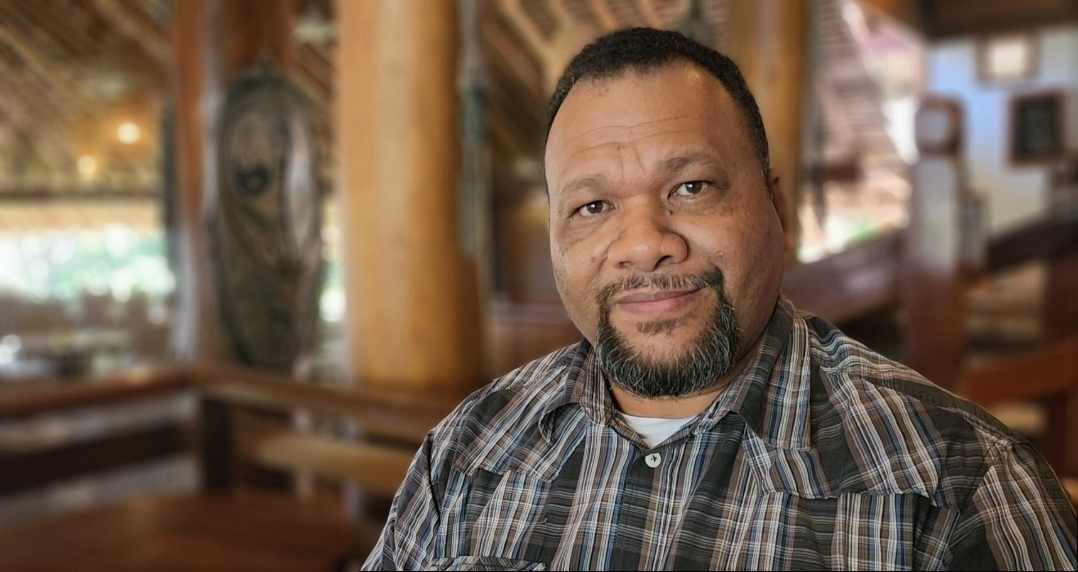Papua New Guinea media are the largest single media industry group of the developing Pacific — and are often at the coalface of learning partnerships, challenges, and opportunities to flex their role as the 4th estate.
In quick Q and A mode with PIF Public Affairs, the current PNG Media Council President Neville Choi – leading media training alongside NFA’s Carolyn Ive facilitating media learning partnerships ahead of the East New Britain Initiative Pacific Fisheries Ministerial and the 8th Pacific Tuna Forum, shares some quick thoughts on the importance of journalists to keep their ethics and sense of justice when reporting fisheries, oceans, and the decisions made by leaders at national, regional and global levels impacting the lives of all people.
Q- Just to start, what for you has been the highlight of being here, talking to the journalists about the importance of talking tuna, this week?
NC – I think the immense importance of such a gathering. The importance of Papua New Guinea and the respect it commands in the Pacific. I think that’s an important aspect that journalists should understand. And the history, the historical richness of the Pacific, especially with the future of the oceans at stake. I think Papua New Guinea has a really large role to play as a leader in the region, and I think journalists in Papua New Guinea have to appreciate that.
Q – What are some of the key stories here? Tuna fisheries is such a big topic, but at the heart of it what are some of the stories that people need to know most?
NC- I think the stories should revolve around contextualised information for Papua New Guineans. Most don’t realise the role that PNG plays in the region and with such a large subject, like tuna and fisheries, breaking it down is a bit technical for journalists. And that’s why I feel that this workshop is important for them to understand the whole of this.
Q- We’ve been talking about challenging media to think about where they will be in 2050—where tuna fisheries are going to be at 2050– what do you say to that question?
NC– I think it brings everybody back to thinking about where the country is going to be and where the region is going to be. There are a lot of geopolitical issues at play. And I think journalists need to understand the global perspective, the regional perspective and of course, that then they can relate to the local perspective and write stories according to that.
Q- You also challenged them to see the issues in other ways—as something that keeps them up at night and is the first thing that wakes them up in the morning. Can you go back to that idea and explain it more?
NC – What I meant was that, if you’re a journalist, you have to have an innate sense of justice, about everything. About everything that you read. About everything that you see, and it has to resonate with you, for you to be able to pursue something and to find the truth. And that’s what journalism is about. Finding the truth. And seeking justice.
Q- The Pacific Tuna Forum is coming up next week. It’s where all the skills picked up this week will be put to the test. How would you approach it as a journalist?
NC – I’d approach it with an open mind. I would approach it with a sense of justice for Papua New Guinea. A sense of justice for the future of the Pacific, and for the future of oceans, which the Pacific relies on.
Q – And then there’s information overload. We come from a region which is constantly in workshops, talking about the big issues that matter. There are so many acronyms. What are your top three tips for getting through that kind of learning experience?
NC – Well, I think I can round it off in one. It is just understanding. Understanding the issues, because if you understand the issues, you’ll be able to have a bird’s eye perspective of everything that’s involved in these issues. And it’s so much. It is sort of an information dump for journalists, but as we’ve been impressing on them since the start of the workshop, if you understand the issues, reporting will be a lot easier.
Q – Tell us in your own words. What does the Pacific look like at 2050?
NC – Well, I’m optimistic. I’m optimistic that if we have a strong media, a very free media, an independent media– I think the media has an important role to hold our leadership into account. Much of the decisions that are made at the national level, at the regional level, at a global level impact on people whether they realise it or not. And it’s our job as journalists, to enforce those messages — to keep everybody up to date as to what’s happening in their lives. That’s the only way we can secure our future.
SOURCE: PIFS/PACNEWS














